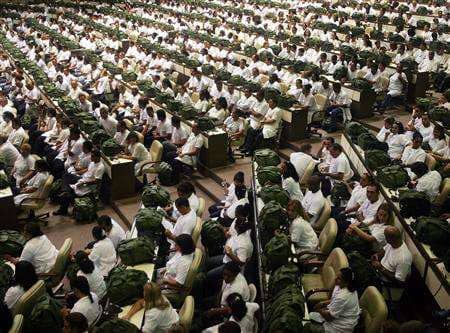 |
| Cuba has the highest primary care physician to population ratio in the world and Cuban doctors have volunteered to serve abroad whenever needed since 1960 |
As
President Obama makes his way to Colombia for the Summit of the Americas -
"to tout his trade record and convince millions of Hispanic voters back
home he cares about the region," as Reuters tartly reported - we found ourselves thinking back
three years when he last attended this regional meeting.
At a concluding press
conference, the president recounted what he learned about the activities of Cuban doctors
in the region thanks to their nation's commitment to "medical
internationalism":
One
thing that I thought was interesting -- and I knew this in a more abstract way
but it was interesting in very specific terms -- hearing from these leaders who
when they spoke about Cuba talked very specifically about the thousands of
doctors from Cuba that are dispersed all throughout the region, and upon which
many of these countries heavily depend.
The
Cubans have been helping nations around the world react to crises and natural
disasters, and to meet their people's primary care needs, since 1960. The
achievements of this program -chronicled by scholars such as John Kirk, and non-governmental organizations like MEDICC-were
well known outside the United States when President Obama heard about them in
April 2009.
Following
the earthquake in Haiti, however, when Cuban doctors already stationed there
were the first to respond, became the backbone of the fight against cholera, and continued
helping Haitians recover and build a new health care system long after many in
the international community diverted their gaze, the full extent of Cuba's
commitment to public health outside its own borders was hard to ignore even in
the United States.
With
the president attending the 2012 Summit of the Americas, we have to ask this:
Who benefits from his decision to continue a Bush-era policy of coaxing Cuban
doctors to leave their medical missions and defect to the United States?
In
2006, the Bush administration started the "Cuban Medical Professional Parole Program" to encourage Cuban medical
personnel saving lives internationally, most often located in rural areas or
slums of the world's poorest countries, to leave their posts. The Program
promised special U.S. immigration rights for these Cuban doctors and health
personnel, today numbering nearly 39,000. Although Cubans who reach the United
States seeking asylum already enjoy preferential immigration status when they
arrive, this program makes Cuban medical personnel eligible for parole abroad.
As Fox News Latino reported, the program was
"the brainchild of Cuba-born diplomat Emilio González, director of the
U.S. Citizen & Immigration Services from 2006 to 2008...a staunchly
anti-Castro exile. He has characterized Cuba's policy of sending doctors and
other health workers abroad as 'state-sponsored human trafficking'."
According
to the Wall Street Journal, more than 1,500 Cuban doctors and
health care personnel received visas under the program issued by U.S.
consulates in 65 countries by the end of 2010. The promise to enter our country
at the head of our long immigration line to practice medicine in the United
States is a powerful inducement, as Cubans devoted to working in the medical
system freely admit. "You'd go, too, if you could triple your pay,"
said Juan Bautista Palay, chief of physical therapy at Havana's 10 de Octubre
Hospital.
It
would be bad enough if this program simply functioned as its authors intended,
to undermine an appealing, humanitarian feature of the Cuban system, no matter
what it meant to patients in the developing world. But the story gets worse.
Once
Cuban doctors arrive, many are prevented from practicing. Sometimes, records
substantiating their credentials are withheld by Cuba's government. Others are disqualified
from
gaining residency because they were once members of the Cuban communist party.
Yes,
as the Miami Herald reported without a trace of
irony, "Questions about party membership remain on residence and
citizenship application forms, as relics from the Cold War, when the United
States deemed communism its chief enemy."
For
Cuban doctors lured here, it's Lucy and the football meets the "Red
scare."
But
most often, the reason Cuban doctors cannot hit the ground running as
practicing physicians in the U.S. is because one piece of crucial information
was withheld in the "parole promise": they cannot hang out their
shingles until they pass the three-part US Medical Licensing Exam, for which
many US medical students bone up for years, through special and costly
preparatory courses...not to mention the several thousand dollars in exam fees
themselves. Other health professionals face similar hurdles.
President
Obama should have ended this nonsense unconditionally three years ago after
encountering the region's reaction to Cuba's doctors; or two years ago after
their heroic work in Haiti made such a decisive difference; or even this month
before attending the Summit in Cartagena. He might have even laid out a program
of medical cooperation with Cuba, as our friend Dr. Peter Bourne recommended, to make the most of what Cuban
doctors have to offer for the medically-underserved in this hemisphere. But he
didn't.
The
next time the heads of government from the region gather at the Summit of the
Americas, we expect Cuba's to be among them.
By
then, our government should stop the shameful -and we think un-American-
practice of plucking Cuban doctors from the world's poorest countries where
they are serving patients and doing so much good.
No comments:
Post a Comment